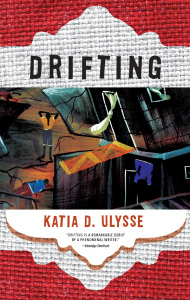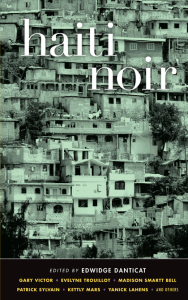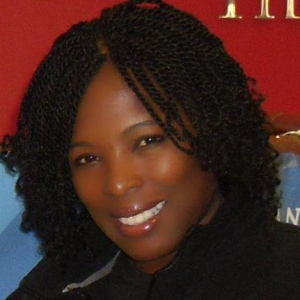Short Story Month: Guest Post from Katia D. Ulysse: The Gift of Storytelling
Writer and Author are garments that I wear only for certain occasions. When the world around me begins to congeal, Writer and Author are like designer overcoats that keep my veins from clogging and a hospital worker from tying a small white tag around my big toe. Sometimes, Writer and Author serve as monolithic pillars behind which I hide for a time. They are twin posts in a neighbor’s wooden fence; and since I am a familiar passerby, the neighbor allows me to lean on the Writer and Author post also for a time. People like me are expected to leave. That caravan of traveling storytellers cannot leave without us. We carry too many stories with us. They are not written on pages. There is no paper in my basket, only a hurricane imagery mixed with memories—some real.

Akashic Books, July 2014.
The line of storytellers whose blood runs in my veins never wrote a word on a page, including their own names. Pens were the weapons of thieves who wore suits stolen from poor land-rich peasants. Paper had its purpose: birth and death certificates, land deeds, kindling for three-rock fires. Whatever paper that was left over was put away for marriage certificates.
Even if pens and paper had been readily available, the storytellers whose style I inherited would have had no use for them. The night was all they needed. They required a rocking chair and maybe a hand-held fan. Telling stories was exhausting work, like moving heirloom furniture from one continent to the next—on foot.
Instead of pen, my great-grandmother required the moon. The mountains in the distance served as the board on which she projected her memory. With one word, shadows came to life. The bald-headed lamps that flickered in the mountains were like eyes. A single story could take seven nights and seven hours to be told. How much paper would such a story require?
Like my great-grandmother and her great-grandmother before her, I sit under a black-black sky to tell stories. There are children gathered about my feet, listening, waiting for the sharp turns, shaking with anticipation. It’s me now in my great-grandmother’s wooden rocker. I sit like market women with legs wrapped around their merchandise, keeping the wind from stealing their wares. The wind can do that, you know. In Haiti, my birth country, especially. The wind can come with such force and voraciousness that it scatters your good paper and congeal the ink in your pen, leaving Writer and Author only the memory of a craft.
A writer without pen and paper is like an electrician in a country without electricity; a dressmaker without a needle. My great-grandmother had no need for those devices. She had memory, imagination, a voice, her eyes, her hands, and all the silence necessary to make a story breathe.
It was always within that silence that her characters crept out of the dark to sit on the porch next to me. I didn’t have to look to know they were there—beasts, long-lost children, women who shed their skin at night, men whose legs grew so long that they dragged as they rode their mules from the city to the mountainside.

Akashic Books, December 2010.
I lived for the nights with my great-grandmother. I lived for those hours when I would be so frightened by my grandmother’s stories that I would want to hide. I would want her to tell me, just once, that the stories were just that. The characters were not real. She never did. She never said: “Oh, don’t worry. These stories are not real.” Thinning the line between present time and hundreds of years before would have diminished the story’s power. Telling would have been an insult to the memory of her great-grandmother.
Now I know that my great-grandmother wanted to give me the gift of storytelling. How she must have enjoyed being frozen with emotions. Her great-grandmother came from a time and place when reality and dream were one; when sea and land were like two lanes on one highway. This was a time when people sank to the ocean floor and returned days later without an explanation. My great-grandmother did not need an explanation. She accepted life’s mysteries. People sank to the bottom of the ocean and came back the next day all the time, didn’t they?
Every night, my great-grandmother gave her stories to me. She trusted me with them; she knew I would fill my basket with them some day, and quite possibly, take them to the market. Even now that I am thousands of miles away from my great-grandmother’s porch, I give my daughter those stories, not in written form—I could not write those stories down. Paper cannot hold them. They are not made of words but of emotions and gestures and darkness and the moon and whatever exists behind the sky. I give them to my daughter as my great-grandmother’s great-grandmother must have heard them from her own family.
I learned how to tell stories from my great-grandmother, Madan Deo. She had an acute sense of occasion. Night time, as far as she was concern, was a time for remembering dismembered faces and putting together scattered places. Never once did I hear Madan Deo say: It’s late. It’s time for you to go to bed. You need to sleep. Night time was when she dreamed while awake. I am grateful for having dreamed while awake alongside her.
Writing stories, as I do today, is an odd exercise. For one reason, I have to write in a language that remains foreign to me. I could learn every entry in the Oxford English Dictionary and still not have enough words to tell stories the way my great-grandmother told them. There is hidden power in the oral tradition. No one would have accused my great-grandmother of being a writer or author. The woman was a born storyteller. Every time I feel the impostor syndrome settling within me like ink in my pen, I remind myself that as a descendant from a long line of storytellers, my job is only to transcribe what I hear from that far, faraway place underneath my skin.

Katia D. Ulysse.
Katia D. Ulysse was born in Haiti, and moved to the United States as a teen. Her writings have been published in numerous literary journals, including the Caribbean Writer, Meridians, Calabash, Peregrine, and Smartish Pace, among others. Her work has also appeared in THE BUTTERFLY’S WAY and HAITI NOIR. Her first children’s book, FABIOLA CAN COUNT, was published in 2013. Ulysse lives in Maryland with her husband and daughter. When she’s not reading, writing fiction, gardening, or teaching, she blogs onVoicesfromHaiti.com.








